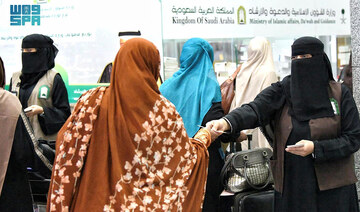ISLAMABAD: Pakistan’s election regulator has banned entrance, exit polls, and surveys to ensure voters have a “free choice” and sought details of expenditure from print, electronic and digital media that ran advertisements of a candidate or a political party, as the South Asian country enters the election phase.
The directives come as part of the Election Commission of Pakistan’s (ECP) 18-point code of conduct for national media ahead of the nationwide elections due in November, but widely expected to be delayed.
The election regulator issues the code of conduct for the media ahead of the elections to ensure a level playing field for all political parties and candidates and to protect voters from any influence.
“Print and electronic media and any journalist, newspaper, and channel on their official accounts on digital media, and other social media influencers shall refrain from entrance and exit polls or conducting any kind of surveys at any polling station or constituency which may influence the voters’ free choice of casting votes,” the code of conduct read.
“If any print, electronic and digital media platform accepts paid political advertisement from a candidate or a political party, it shall provide details of expenditure made by the political party or the candidate to the ECP as per law.”
The code of conduct also makes it mandatory to seek comments from both sides, if a candidate levels an allegation against another.
Haroon Khan, a spokesperson for the ECP, said the purpose of the ban on the entrance and exit polls was to “protect” voters from any kind of influence.
“The purpose is to protect voters from getting influenced of these polls and surveys,” he told Arab News, adding this would also help protect “secrecy of the ballot” in the elections.
The ECP has directed the Pakistan Electronic Media Regulatory Authority (PEMRA), the Pakistan Telecommunication Authority (PTA) and the Ministry of Information to monitor the coverage given to political parties and candidates for their election campaigns through television channels, print and social media.
“The above authorities shall submit to the commission details of payments made by political parties and candidates within 10 days after poll day,” it said.
The ECP has also directed all these authorities to assist it in implementation of this code of conduct.
“They shall further provide at any time, any information required by the Election Commission of Pakistan in discharge of its duties,” it said. “No print, electronic or digital media shall run campaigns of candidates and political parties at the cost of public exchequer.”
In case of violation of the code of conduct, the ECP said, it reserved the right to withdraw accreditation of an individual journalist or media organization. “The authority to determine the violation also rests with the Election Commission of Pakistan,” it added.
Rashid Chaudhry, deputy director of programs at the Islamabad-based monitor Free and Fair Election Network (FAFEN), said the entrance and exit polls could be used to build perception about a specific candidate or a political party on the polling day, therefore a ban on it was justified.
“The entrance, exit polls and surveys could influence result in favor of a candidate or political party, therefore it is better print, electronic and digital media should refrain from it,” he told Arab News.
About political financing, he said, the election commission should take measures to regulate the election expenses instead of pushing media to submit details of expenditures of the candidates who used their platform for advertisement.
“The ECP needs to adopt a holistic approach to handle the political financing and elections expenditure to ensure a level playing field for all candidates and political parties,” he said.
“The ECP cannot track the election expenses of a candidate or political party if they are paying for advertisements on digital platforms through credit cards.”
As per the election laws, a National Assembly candidate is allowed to spend Rs10 million and a provincial assembly candidate is allowed to spend Rs4 million on his election campaign, while there is no limit of expenditure for political parties contesting the polls.
The development comes at a time when Pakistan witnesses the transition of power to a caretaker setup, which is constitutionally bound to hold the elections within 90 days of the dissolution of the National Assembly, the lower house of Pakistan parliament, on August 9.
However, the outgoing government’s decision to approve the results of the 2023 digital census means the election regulator would be required to redraw hundreds of constituencies as per those results.
The ECP will be able to provide an election date only once the constituencies are redrawn and the vote is thus widely expected to be delayed to as far ahead as February.



















